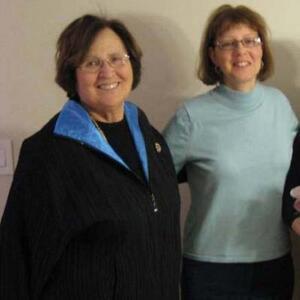Judith Wolf
Judith Wolf was born in 1932 in Dorchester, Massachusetts. Her career has centered on Jewish philanthropy in both Boston and New York City. Wolf attended Wellesley College before pursuing a PhD from Boston College. Over the years, she has worked for various organizations, including the Women's Plea for Soviet Jewry; the American Jewish Congress, Women's Division; the Jewish Relations Council; and the International Relations Committee. Her initial involvement in the Movement for Soviet Jewry centered on public relations and efforts to lobby government officials in both Washington and Boston. By the 1990s, she was working with Action for Post-Soviet Jewry. As chair of the Cultural Commission of the International Relations Committee, she helped with the Kehillah project in Dnepropetrovsk, Ukraine. She has been mainly involved in efforts to aid children with disabilities who cannot integrate into society because of cultural norms in the FSU.
Judith reflects on her upbringing in Dorchester, Massachusetts, where she grew up in a multifamily house with her grandparents. She recalls her neighborhood being a very homogenous Jewish community at the time, focusing on the Orthodox shul in the area, now called Beth El. Wolf remembers moving various times to find employment during the McCarthy era during her early married life. During this time, Wolf talks about becoming involved in organizations such as the Ethiopian Jewry Committee, the Women's Plea for Soviet Jewry, and the Jewish Community Council. She describes her dedication to volunteer work as central to her adult life, recalling that many women at the time were “professional volunteers.” Wolf recalls her religious schooling and the impact of growing up in a predominantly Jewish neighborhood on her values. She describes attending shul with her grandmother as a young girl and how Jewish modes of thinking became a part of her life before she knew anything else. She describes her work in Ukraine, which began as a Kehillah Project to connect Dnepropetrovsk to a sister city, Boston. After a few visits, Wolf recalls the lack of adaptive or accessible programming for disabled children in the area. She discussed it with her daughter, Sue Wolf-Fordham, whose own daughter has a disability, before ultimately collaborating to create an Educational Resource Center in Dnepropetrovsk. This included putting together a social program for disabled youth, bringing accessible toys and tools to kids, and providing advocacy groups and support for parents of children with disabilities. Wolf closes by talking about her family, a long line of people who believed in women. Attending all girls’ schools exposed Wolf to the women’s movement before it had been articulated as such. She notes that the traditional Jewish women’s role has been the problem solver, dealing with the real world.



